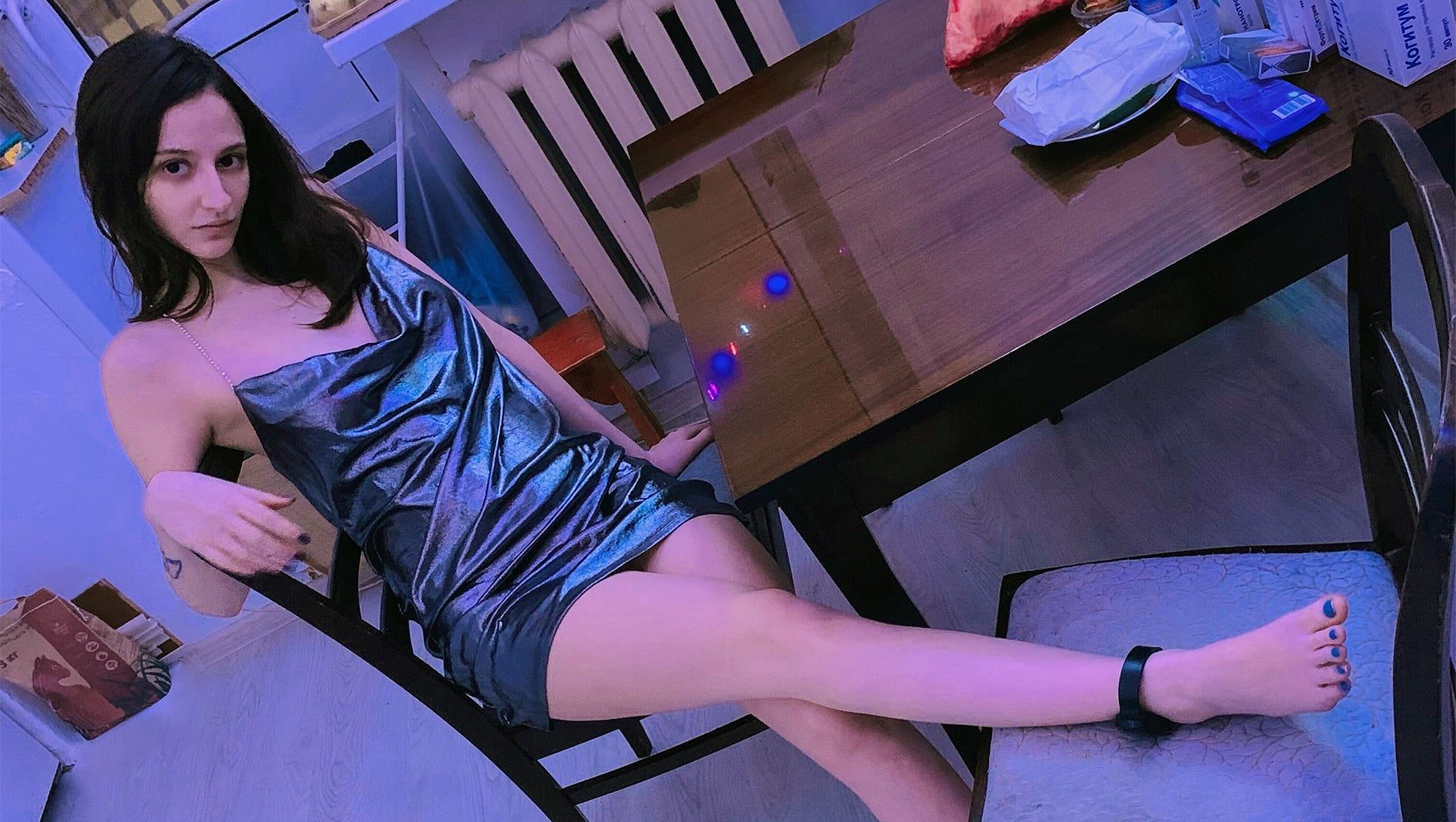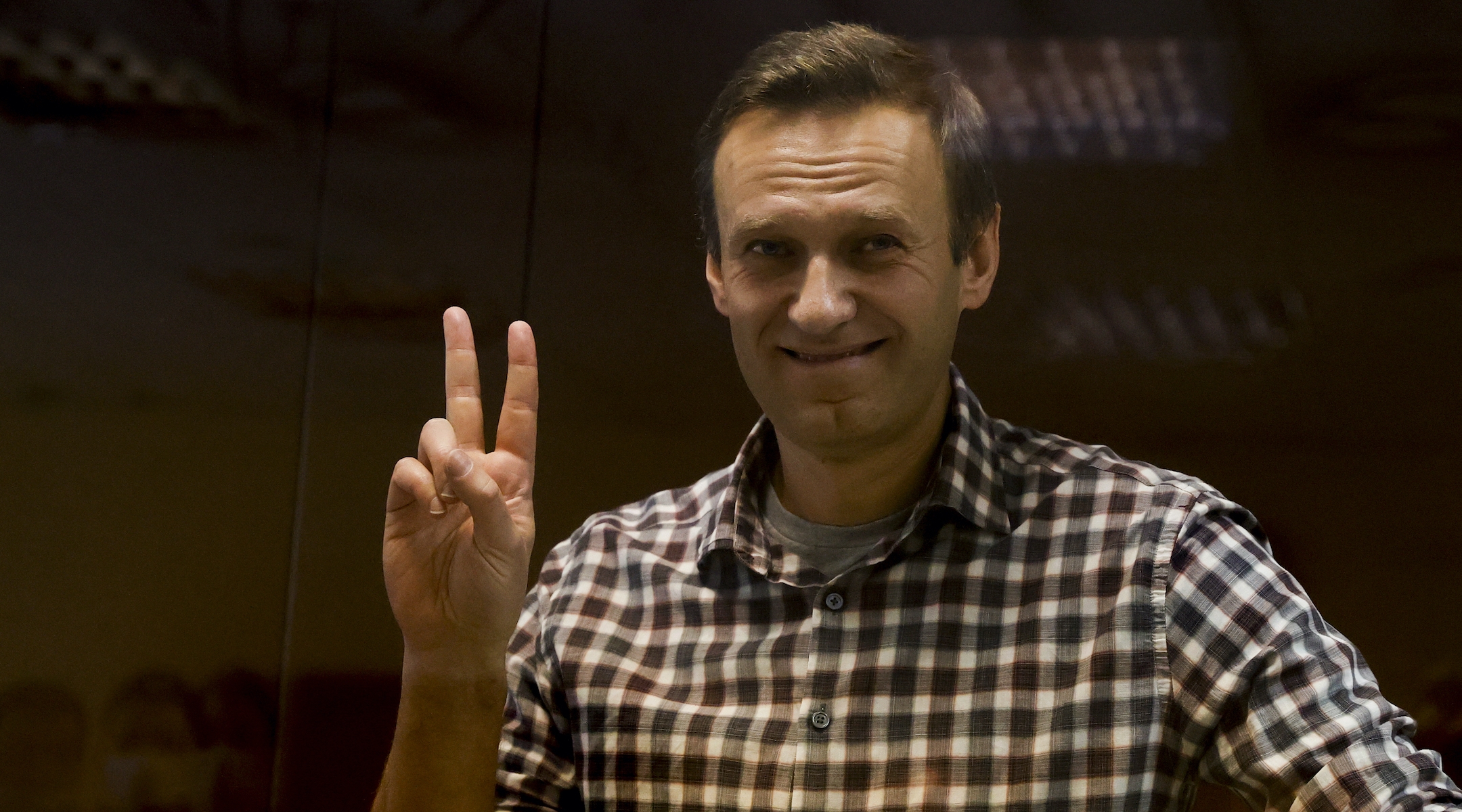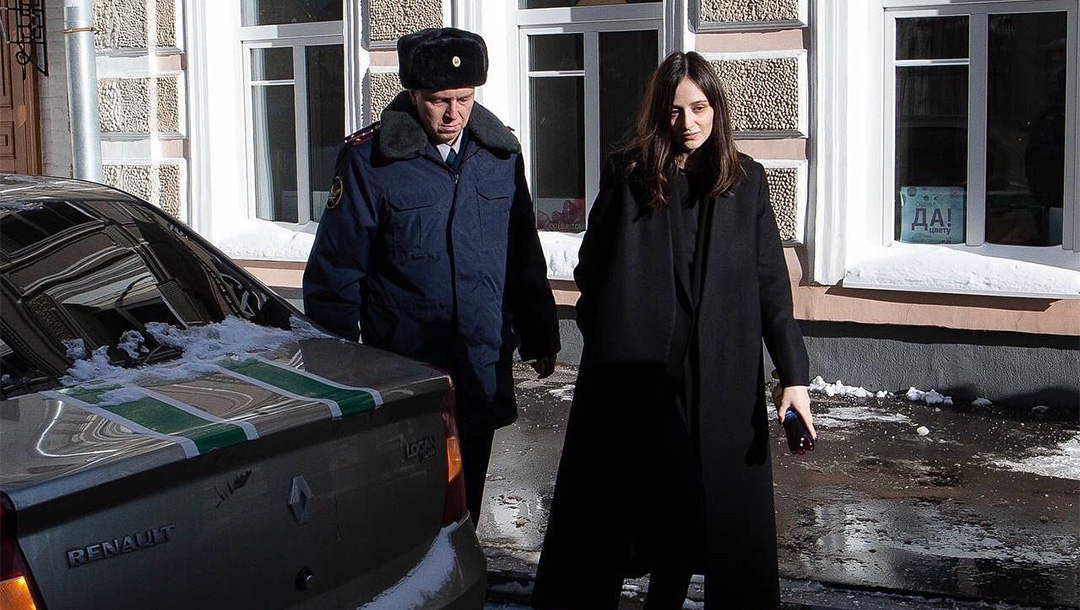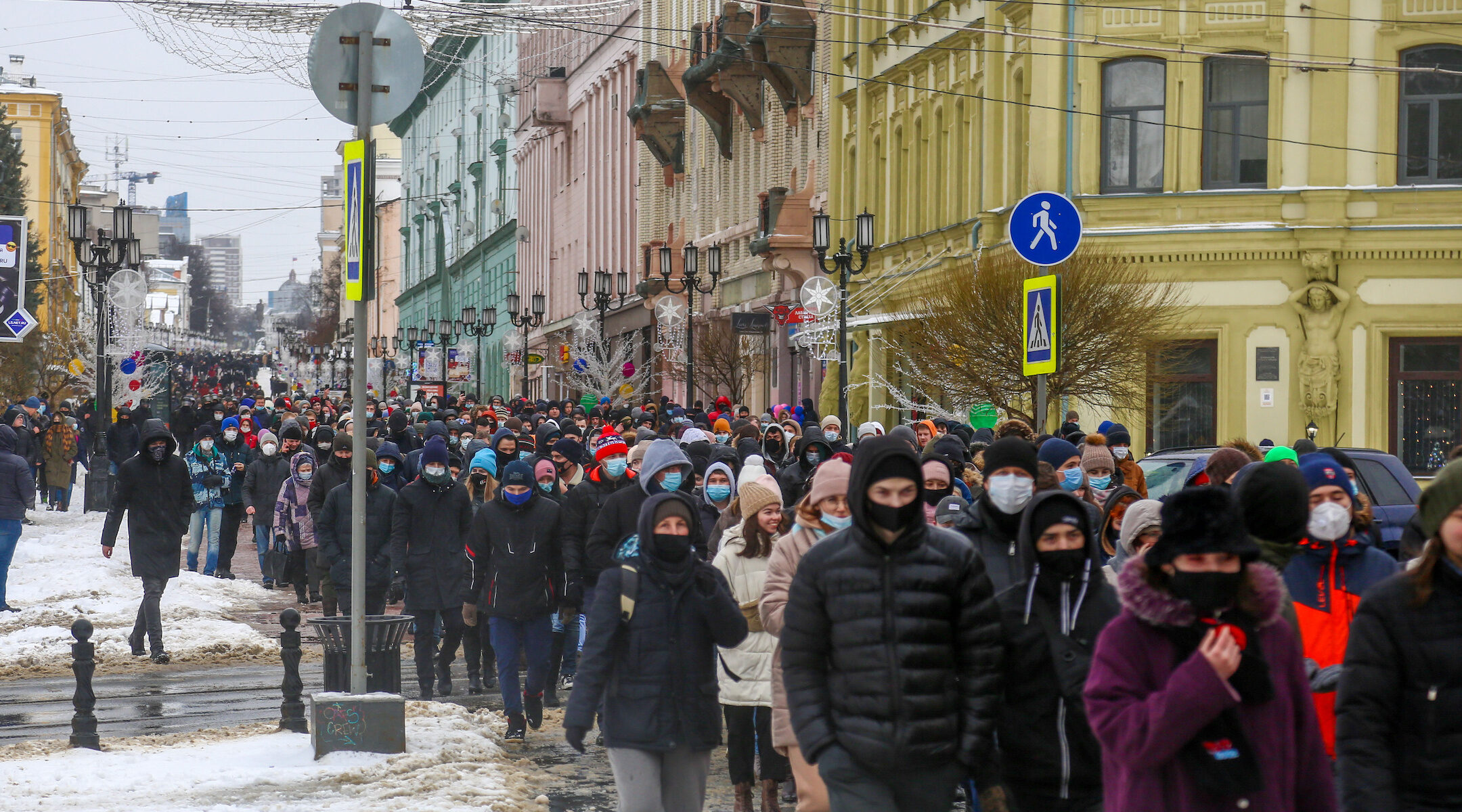(JTA) — Lucy Shteyn is only 24 years old, but she already has firsthand knowledge of what awaits vocal critics of President Vladimir Putin in her native Russia.
In 2018, a year after Shteyn, a Jewish gay rights activist and a prominent opposition activist, was elected to Moscow’s city council, hackers got into her cellphone and computer. They released many of her personal pictures and correspondence online.
One of the pictures was of a well-known film critic, who is married, sleeping in her bed. Moskovskaya Gazeta, a tabloid that ran the pictures, labeled Shteyn “a hunter of married men” living a life full of “drugs and techno.” On ultranationalist forums, anonymous users called her a “Jewish whore” and posted pictures of Auschwitz with her name as a hashtag.

Lucy Shteyn wears an electronic bracelet under house arrest at her home in Moscow, Russia, Feb. 14, 2021. (Courtesy of Shteyn)
The hack against Shteyn, a former journalist for Radio Liberty, was not the first of its kind, or the most dangerous. In 2019, gay rights activist Yelena Grigoriyeva was murdered in St. Petersburg shortly after her personal details were leaked and she appeared on a homophobic group’s hit list.
But this has done little to subdue Shteyn. She has infuriated supporters of Putin’s anti-gay policies by posting pictures of herself kissing another woman. In a tribute to the punk protest band Pussy Riot, Shteyn has also made plaster mold castings of her breasts and affixed them to historic buildings.
On Jan. 23, Shteyn was arrested in Moscow during a rally in support of Alexey Navalny, the former businessman turned politician who has presented the most serious challenge thus far to Putin’s 20-year hold on power. After Navalny was poisoned in Russia with nerve gas last year, he was treated in Germany before returning last month to Russia to face a trial he has said was rigged. He was arrested upon his return and sentenced to 2.5 years in prison for corruption charges that he says are fake.
In response, thousands of Russians have taken to the streets to protest Putin’s government since late January in the largest such movement since 2019. Authorities have arrested hundreds of the protesters, and Shteyn’s relatively high profile may have marked her for further legal action.
On Jan. 27, police broke into her home and confiscated her computer, the news site 24SMI reported. Based on information gathered from it, the Basmanny District Court of Moscow on Monday placed Shteyn under house arrest until March 23, pending a trial for incitement to violation of sanitary and epidemiological rules. She could spend years in jail if convicted.
Shteyn is far from the only Jew in Navalny’s corner.
Leonid Volkov and Maksim Kats, two tech-savvy individuals from Jewish homes, had key roles in Navalny’s unsuccessful 2013 bid to be elected mayor of Moscow.

Alexei Navalny stands inside a glass cell during a court hearing at the Babushkinsky district court in Moscow, Feb. 20, 2021. (Sefa Karacan/Anadolu Agency via Getty Images)
“Russians today are living in an Orwellian society, where an enormous propaganda machine teaches people that two plus two equals five, and you have to be very brave to contradict this,” Volkov, who left Russia in 2014, told Mishpacha magazine last month.
But Russia’s two main Jewish communal organizations — the Chabad-affiliated Federation of Jewish Communities in Russia, or FJCR, and the non-Chabad Russian Jewish Congress — have remained silent about the unrest.
They see Putin as a friendly force for Russian Jews, a leader who has allowed their communities to thrive. They argue that he has facilitated their growth through government-gifted land for synagogues and consistent enforcement of Russia’s anti-discrimination laws against perpetrators of anti-Semitic hate crimes.
In 2015, a leader of FJCR, Alexander Boroda, spoke candidly about the reasons for his group’s support for Putin.
“The Jews of Russia must realize the dangers inherent in the possible collapse of the Putin government, understand the rules of the game and be aware of the limitations,” he said at a conference of the Limmud FSU Jewish learning group.
“In Russia, there is virtually unlimited freedom of religion and the Jewish community must ensure this situation continues,” Boroda added. “The support for religious institutions is wider than in the United States and defense of Jews against manifestations of anti-Semitism is greater than in other European countries. We do not have the privilege of losing what we have achieved and the support of the government for the community.”

A police officer escorts Lucy Shteyn to court from house arrest at her home in Moscow, Russia, Feb. 15, 2021. (Courtesy of Shteyn)
The Putin government’s treatment of the LGBTQ and Muslim communities has been decidedly different.
In 2013, Russia outlawed “gay propaganda among minors” amid a wave of homophobic rhetoric on state television that coincided with a rise in violent incidents, some of them deadly. Most of those crimes have remained unsolved, according to the SOVA human rights watchdog.
The Russian government has also furthered its longtime crackdown on what it calls radical Islam, jailing clerics suspected of extremist incitement, denying them legal recourse and allegedly torturing some of them.
When it comes to tolerance of minorities, Navalny’s own record is not without blemish. In 2007 he was expelled from the liberal Yabloko party, which was founded by the Jewish economist Grigory Yavlinsky, for attending a far-right event called the “Russian March.” It was one of many expressions of xenophobia sparked by the immigration to Moscow of millions of Muslims from parts of Russian Central Asia.
In a YouTube video from that year meant to bolster Navalny’s political career, Navalny portrays a pest control specialist dispensing tips on how to exterminate immigrants from Central Asia, whom he calls flies and cockroaches. The skit ends with him shooting a man wearing Muslim traditional garb, including a black robe and keffiyeh.
While seeking to broaden his base, Navalny gradually moved away from such jingoism, but his flirtation with it has not helped him gain the trust of leaders of ethnic minorities in Russia, which is home to about 200,000 Jews.
As Putin tightens his grip on Russian media, the courts and what little remains of freedom of expression online, tens of thousands of Russian Jews are leaving. In addition to Putin’s assault on democracy, a recession is ravaging the Russian economy. Following a crash in its oil prices, the Russian ruble is now worth half its 2014 value against the dollar.
Since 2015, about 60,000 Russian citizens have immigrated to Israel alone under its Law of Return for Jews and their relatives. In the entire decade prior to 2015, only 36,784 Russian Jews had come.
“Ninety percent of Russians really love Putin. They admire him, they think he’s doing the right thing, focusing on hating minorities and gay people,” one of the newcomers, a marketing specialist named Dima Eygenson, told JTA in 2019. “The other 10 percent, to which I belong, don’t feel free to say what we think about this.”
JTA has documented Jewish history in real-time for over a century. Keep our journalism strong by joining us in supporting independent, award-winning reporting.






